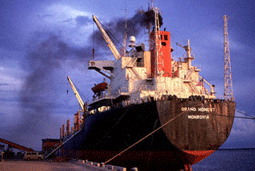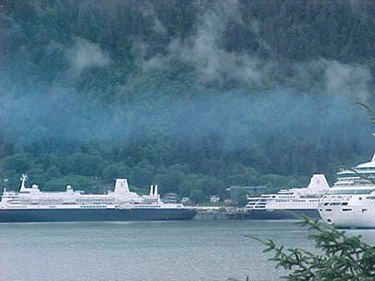Greening California’s Seaports
Air Date: Week of January 6, 2006

(Photo courtesy of Bluewater Network)
The Port of Los Angeles, one of the busiest seaports in the world, has some new and unusual leadership. It's all part of a turn of events for ports. They're under unprecedented pressure to reduce air pollution as it becomes clear their emissions equal millions of cars on the road each day. Living on Earth's Ingrid Lobet has the latest installment in the series "The Haze Over Trade."
Transcript
YOUNG: Much of America's $1.5 trillion dollars in imports come ashore at seaports and traditionally, the income these ports generate for their cities has overshadowed concerns over air pollution from truck exhaust and ship smokestacks. But that's changing in California. Living on Earth's Ingrid Lobet has the latest in our occasional series "The Haze Over Trade".
LOBET: You might not guess right off that this man oversees the management and operations of one of the busiest seaports in the world.

(Photo courtesy of Bluewater Network)
LOBET: That's David Freeman, a longtime environmentalist and public utilities expert. When Los Angeles Mayor Antonio Villaraigosa named Freeman president of the Los Angeles Harbor Commission, he told Freeman to make the city's port the greenest in the country. One of the first things Freeman did was examine a recently hashed-out plan to control particles and nitrogen oxide pollution at the port and declare it insufficient. The plan had been considered ground-breaking. It aimed to reduce the number of pollution-related deaths by half.
FREEMAN: Well, I'm just a fellow from Tennessee who doesn't really understand differential equations, but I take half of 3,400, I get 1,700 – 1,700 premature deaths. I just don't see how that could possibly be satisfactory.
LOBET: Freeman headed the Tennessee Valley Authority, the southeastern water, land and power agency, under President Carter. He was also at the helm of LA's Department of Water and Power. Now he's asking this:
FREEMAN: What is the level of emissions where you can say the port of Los Angeles is not contributing unhealthy air? That's what I want to know.
MARQUEZ: It is a very dramatic change.
LOBET: Jesse Marquez is a public health activist who closely watches port issues.
MARQUEZ: Because, first of all, he doesn't come from the industry. Typically, they've always chosen an insider.
LOBET: Marquez, who’s never lived out of sight of the giant yellow cranes of the port of LA, says he's already noticed a change when he goes to port meetings.
MARQUEZ: One of the things that we're seeing immediately with the new board of Harbor Commission is that they are not hesitating, they are not waiting to find out when can we implement something and then when they say it will take six months to implement something, they challenge that. ‘Well, why is it going to take six months? Is it possible to do it in 90 days?’ So, almost everything that has come before them in the last two months of their existence, the agenda has been moved up.
LOBET: City leadership is only one source of pressure on the twin ports of Los Angeles and Long Beach. The agency that enforces air pollution rules in the greater LA area recently vowed to press the ports and the shipping industry to the "maximum extent of its authority" in a new Clean Ports Initiative. It even floated a possibility no one has suggested before in the United States – treating the entire seaport complex, with all its ships and vehicles, the same as a single factory.
T.L. Garrett is with the Pacific Merchant Shipping Association which represents shippers and port terminal operators. His members agree, he says, that air pollution is a terrible problem, but a single pollution cap is a not a practical or fair solution.
GARRETT: Ports are not a single source. I think the port of Los Angeles has 160 tenants. I think the port of Long Beach has a similar number. You can't regulate them as a unified source in my opinion because basically what you're doing is you're saying to one company, ‘You're responsible for the sins of your competitor.’ I just don't see that working in a free market system.

(Photo courtesy of Bluewater Network)
LOBET: These businesses, who offer berths to incoming ships, and the shippers themselves, are already switching out diesel equipment for electric. They're selling old engines and buying newer, cleaner ones. Still, the pressure is on them from all sides. In Sacramento, the California Air Resources Board, perhaps the world's most powerful air pollution agency, recently voted to regulate ships 24 miles offshore, far outside the state's three mile authority. Ships off the coast of California will now have to burn a cleaner fuel in the engines they use for electricity. Until now, air regulators have said they lacked the authority to tell ships what to do offshore. But the Air Resources Board's Jerry Martin says now state attorneys have taken another look.
MARTIN: Our data shows that we can pick up ship emissions from 24 miles offshore. That means that that's affecting public health, and, of course, our job is to protect public health as much as possible.
LOBET: Even though the new measure doesn't affect ships' main engines, which are four times more polluting than the engines used for electricity, Teri Shore, Clean Vessel Campaign Manager for the Bluewater Network, says it's still significant.
SHORE: This is very important because it is the first time a state has exerted its authority to regulate emissions from ships that sail along its coastline and come into its ports. So these ships burn tons of fuel per hour, even when they are sitting at the dock. These ships burn the dirtiest fuels out there, literally the bottom of the barrel. They're 100 to 1,000 times dirtier than the diesel fuel cars and trucks run on.
LOBET: The cleaner fuel requirement will cost the typical cargo ship an average $3,500 per visit. The state estimates 200 to 300 million dollars annually in saved healthcare costs. The state expects to be sued over the new regulation. T.L. Garrett at the Shipping Association says it's too early to talk about that. But he says California shouldn't be regulating a problem that is national and international.
GARRETT: We don't want to see a patchwork of regulations where a ship that comes into Calfiornia is subjected to different regulations than one that goes into Washington, Oregon or Florida, or New York. We want to see a unified process, and we think the federal government is best positioned to ensure a unified process throughout the United States.
LOBET: Garrett says the trade and transport industries are hearing about air pollution as an issue not only in Los Angeles-Long Beach, but also in Houston, Seattle, New York and New Jersey. The new president of the LA Harbor Commission, David Freeman, says he's mindful of that, and hopes measures taken here will spread.
FREEMAN: We are a leader, and we are, by gosh, going to lead. You can call it a crusade or whatever you what to call it, but we are going to clean up all the ports in the world.
LOBET: Environmental justice groups have already begun organizing at port sites from Baja, California to British Columbia. For Living on Earth, I'm Ingrid Lobet in Los Angeles.
Links
California State Efforts On Trade-related Pollution
Port of Los Angeles Clean Port Efforts
Living on Earth wants to hear from you!
Living on Earth
62 Calef Highway, Suite 212
Lee, NH 03861
Telephone: 617-287-4121
E-mail: comments@loe.org
Newsletter [Click here]
Donate to Living on Earth!
Living on Earth is an independent media program and relies entirely on contributions from listeners and institutions supporting public service. Please donate now to preserve an independent environmental voice.
NewsletterLiving on Earth offers a weekly delivery of the show's rundown to your mailbox. Sign up for our newsletter today!
 Sailors For The Sea: Be the change you want to sea.
Sailors For The Sea: Be the change you want to sea.
 The Grantham Foundation for the Protection of the Environment: Committed to protecting and improving the health of the global environment.
The Grantham Foundation for the Protection of the Environment: Committed to protecting and improving the health of the global environment.
 Contribute to Living on Earth and receive, as our gift to you, an archival print of one of Mark Seth Lender's extraordinary wildlife photographs. Follow the link to see Mark's current collection of photographs.
Contribute to Living on Earth and receive, as our gift to you, an archival print of one of Mark Seth Lender's extraordinary wildlife photographs. Follow the link to see Mark's current collection of photographs.
 Buy a signed copy of Mark Seth Lender's book Smeagull the Seagull & support Living on Earth
Buy a signed copy of Mark Seth Lender's book Smeagull the Seagull & support Living on Earth

